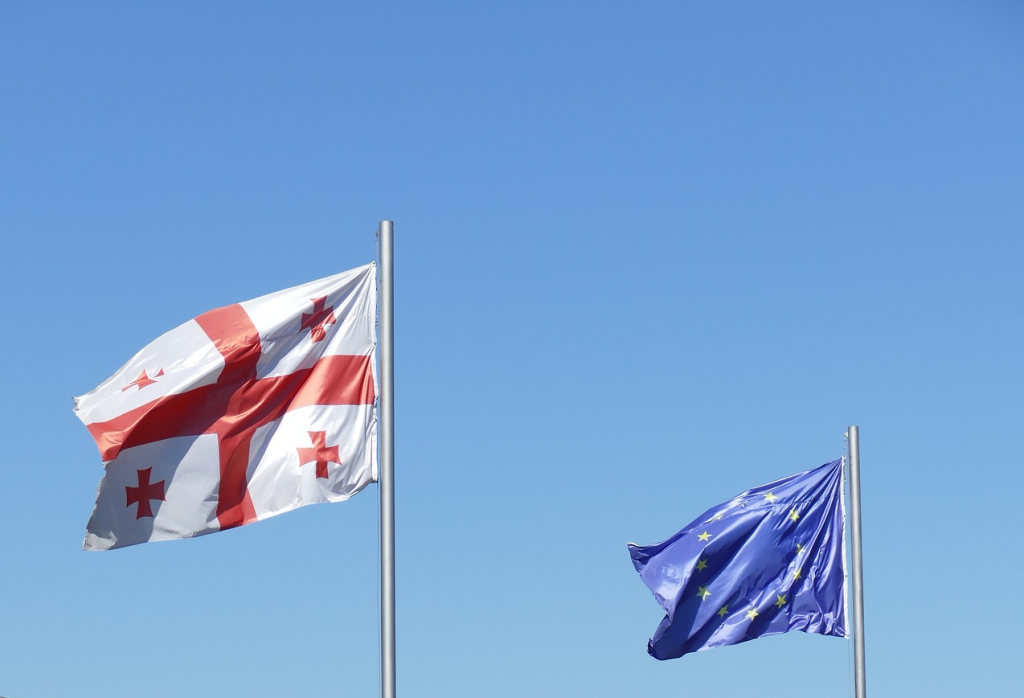Georgia’s European Dream: Progress, Challenges, and the Road Ahead
24 April 2023 /
Fatima Dennaye 5 min

Georgia, with its rich history and cultural heritage, has always had a European orientation. Following its independence from the Soviet Union in 1991, the country has made significant progress in its pursuit of closer ties with Europe and embarked on a path of democratic reforms and Euro-Atlantic integration. However, it has also faced numerous challenges along the way, being often caught between the pro-European sentiment of its citizens and the geopolitical goals of its powerful neighbor, namely Russia.
Steps towards the EU
The dream of joining the European family has been a driving force behind Georgia’s foreign policy and domestic reforms. However, joining the EU is a long and complex process that involves several stages and requisites.
About a week after the Russian invasion of Ukraine in February 2022, Georgia submitted its EU membership application. In June 2022, the European Commission assessed and issued an opinion on the application. Shortly thereafter, the European Council expressed readiness to grant Georgia official candidate status, provided it addresses the political and economic priorities set out in the Commission’s opinion.
In December of the same year the Council mentioned Georgia for the first time in its conclusions on “Enlargement and the Stabilization and Association Process“, recognising the important steps it had taken in its reform process and encouraged the country to continue on this path.
Yet the relationship between the EU and Georgia is not a recent development. In 2014, the country signed an Association Agreement (AA) with the EU, which included a Deep and Comprehensive Free Trade Area (DCFTA); this represented a significant milestone on Georgia’s path to European integration. The AA/DCFTA have promoted closer cooperation with the bloc in many areas such as trade. It also laid out ambitious political, economic and social reforms for the country to implement and provided a roadmap for Georgia’s further progress towards European integration.
A compromised European dream?
For several weeks, Nana Malachkhia has become an undisputed symbol of Georgians’ aspiration to join the European Union.
The video of the 47-year-old woman waving the European flag in front of a powerful water cannon immediately went viral on social media. The footage shows that the woman, although soaked, remains steadfast and determined not to back down in front of law enforcement officers, and when the water jet becomes too strong causing her to stagger, she is joined by other protesters who stood around in a block to protect her. But what’s the context of this protest?
On March 7, thousands of people gathered in Tbilisi to express their anger at the government that threatened to shatter their European dream by passing a bill on “foreign agents”. The text, modeled on a Russian law aimed at stifling critical voices and suppressing dissidence, establishes that media outlets and NGOs receiving more than 20% of their annual income from abroad should register as “foreign agents” or else face substantial fines.
Through a video shot in New York, the President of Georgia Salome Zurabishvili, sent a message of support to the protesters and stated that “the path of European integration must be protected, and those who support this law today violate the constitution and take us away from Europe”.
Indeed, the adoption of this text would have had major, not to say disastrous, consequences as it runs counter to Georgia’s democratic development and is incompatible with EU values and standards, as can be read in an EU statement.
However on 10 March, the ruling party formally abandoned the controversial bill on “transparency of foreign influence”. This step was celebrated across the country and was interpreted as a victory for Georgian people.
Lessons from Georgia, Ukraine and Moldova?
Non-EU countries that are fighting tooth and nail for their European dream provide valuable lessons in determination, commitment, unity, and perseverance. Europeans can learn from these examples that foster a sense of appreciation for the EU, renew commitment to European integration, and inspire positive actions towards building a stronger and cohesive Europe.
In reaction to the images about the protests in Tbilisi, MEP Raphaël Glucksmann tweeted urging people to appreciate Europe, beyond all its faults. He continues by saying that “The European Union is not just a market or a bureaucracy. People don’t rise for a market or a bureaucracy… If you doubt the European project, ask the Ukrainians or the Georgians and those who are ready to do anything to join us”.
A long way to go
For Georgian people, the failure to obtain candidate status can be traced back to the government’s action – or inaction – in meeting the Commission’s 12 conditions.
In recent years, the Georgian government has faced criticism from observers, who accuse the country of democratic backsliding. Indeed, the “foreign agents” bill is just the tip of the iceberg. The government is at the root of the gradual deterioration of Georgia’s institutions as it has attempted to limit the independence of the judiciary, suspended anti-corruption reforms, and tried to take control of some media.
Today the priorities that need to be addressed -among others- are de-polarisation and de-oligarchization.
Despite the challenges, Georgia’s European dream is unwavering. The country has shown determination and resilience in its quest for European integration. Georgian people must continue their efforts to implement pro-EU reforms, strengthen democratic institutions and solve systemic problems. Furthermore, it is important to maintain constructive relations with the EU and its Member States, as well as other international partners.
Fatima Dennaye
MA European Studies
